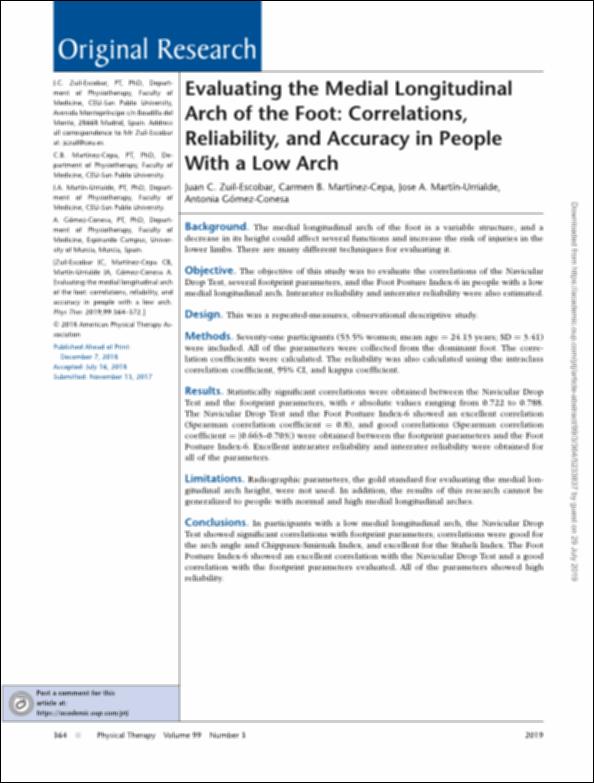Please use this identifier to cite or link to this item:
http://hdl.handle.net/10637/13124Evaluating the Medial Longitudinal Arch of the Foot : Correlations, Reliability, and Accuracy in People With a Low Arch.
| Title: | Evaluating the Medial Longitudinal Arch of the Foot : Correlations, Reliability, and Accuracy in People With a Low Arch. |
| Authors : | Zuil Escobar, Juan Carlos Martín Urrialde, José Antonio Martínez Cepa, Carmen |
| Authors: | Gómez Conesa, Antonia |
| Abstract: | Background. The medial longitudinal arch of the foot is a variable structure, and a decrease in its height could affect several functions and increase the risk of injuries in the lower limbs. There are many different techniques for evaluating it. Objective. The objective of this study was to evaluate the correlations of the Navicular Drop Test, several footprint parameters, and the Foot Posture Index-6 in people with a low medial longitudinal arch. Intrarater reliability and interrater reliability were also estimated. Design. This was a repeated-measures, observational descriptive study. Methods. Seventy-one participants (53.5% women; mean age = 24.13 years; SD = 3.41) were included. All of the parameters were collected from the dominant foot. The correlation coefficients were calculated. The reliability was also calculated using the intraclass correlation coefficient, 95% CI, and kappa coefficient. Results. Statistically significant correlations were obtained between the Navicular Drop Test and the footprint parameters, with r absolute values ranging from 0.722 to 0.788. The Navicular Drop Test and the Foot Posture Index-6 showed an excellent correlation (Spearman correlation coefficient = 0.8), and good correlations (Spearman correlation coefficient = |0.663–0.703|) were obtained between the footprint parameters and the Foot Posture Index-6. Excellent intrarater reliability and interrater reliability were obtained for all of the parameters. Limitations. Radiographic parameters, the gold standard for evaluating the medial longitudinal arch height, were not used. In addition, the results of this research cannot be generalized to people with normal and high medial longitudinal arches. Conclusions. In participants with a low medial longitudinal arch, the Navicular Drop Test showed significant correlations with footprint parameters; correlations were good for the arch angle and Chippaux-Smirnak Index, and excellent for the Staheli Index. The Foot Posture Index-6 showed an excellent correlation with the Navicular Drop Test and a good correlation with the footprint parameters evaluated. All of the parameters showed high reliability. |
| Description: | En: Physical Therapy. e-ISSN 1538-6724 vol. 99 (2019) n. 3, pp 364-372 |
| URI: | http://hdl.handle.net/10637/13124 |
| Rights : | http://creativecommons.org/licenses/by-nc-nd/4.0/deed.es |
| Issue Date: | 5-Nov-2019 |
| Center : | Universidad San Pablo-CEU |
| Appears in Collections: | Fisioterapia |
Items in DSpace are protected by copyright, with all rights reserved, unless otherwise indicated.


